Have you ever wondered why certain moments, people, or situations leave you feeling drained, irritable, or anxious, out of nowhere? The answer often lies in a stress trigger—a hidden cue in your environment, thoughts, or body that sparks tension before you even realize it.
Recognizing personal stress triggers is essential for enhancing mental clarity, physical health, and emotional resilience.
This practice allows for the decoding of physical and emotional cues, spotting patterns triggering stress, and adopting strategies like guided meditation and stress-tracking journals to neutralize these triggers.
In this guide, the goal is not to eliminate challenges but to build a conscious, empowered relationship with stressors, transforming overwhelming moments into actionable insights for a healthier, balanced life.
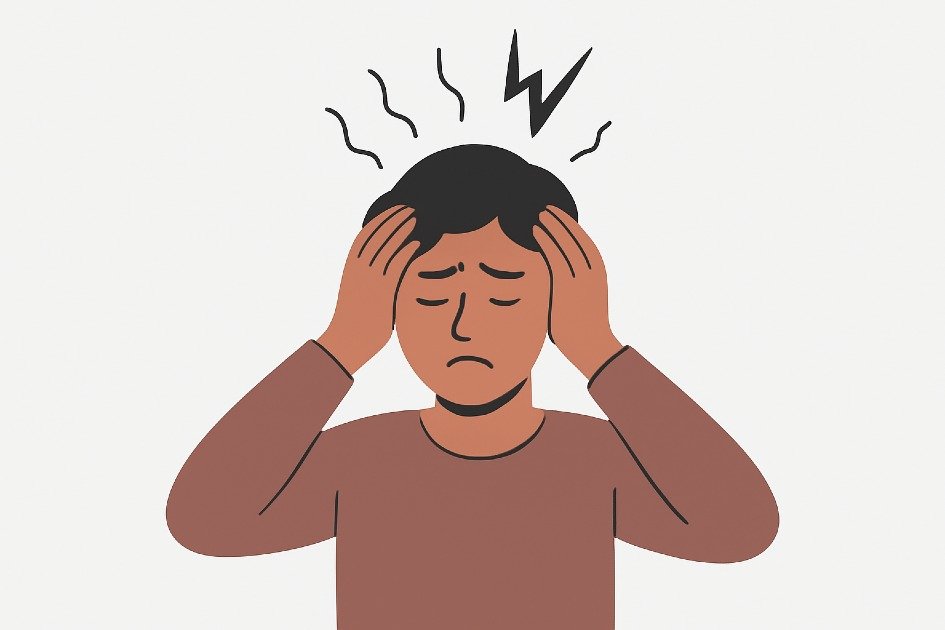
Why Understanding Stress Triggers Matters
Stress is often initiated by recurring situations, thoughts, or habits that trigger reactions in the mind and body. Identifying these stress triggers enhances one’s control over personal well-being.
The Hidden Role Stress Plays in Everyday Life
Stress triggers, often unnoticed in daily life, can include traffic jams, messy environments, or persistent tasks like unread emails.
These minor events accumulate, creating significant mental load that depletes patience and makes even simple tasks feel burdensome.
Notice small moments that make you tense. Jot them down on your phone when stress hits. After a while, you will start to see clear patterns of what really triggers you.
I used to think my morning stress came from running late. But really, it was skipping breakfast and searching for my keys. Now, I set everything out the night before—and my mornings feel calm and easy.
Hidden Triggers Slowly Sap Your Energy
Stress can manifest quietly through subtle triggers like late-night social media use or overcommitting to tasks.
These minor actions can deplete your energy, leading to feelings of laziness or lack of motivation, when constant reactions to these triggers are the real source of exhaustion.
Do a quick weekly check-in. Ask yourself, “What moments drained my energy?” Find the real cause —it was scrolling on social media or saying yes too often at work.
I realized my low mood always came after late-night scrolling. The phone was not the real problem—it was comparing myself to others. When I replaced scrolling with reading, I woke up feeling calmer and more focused.
Why Self-Awareness Is the First Step to Real Relief
Relief from stress begins with recognizing the triggers rather than relying on gadgets or routines. True change comes from understanding these triggers.
End your day with a quick reflection. Write down one stressful moment and ask, “What caused this?” Soon, you will spot patterns.
I used to feel overwhelmed every evening before dinner — it was my biggest stress trigger. Once I noticed this pattern, I started preparing meals earlier in the day. Now, our evenings feel calmer, and I enjoy family time again.
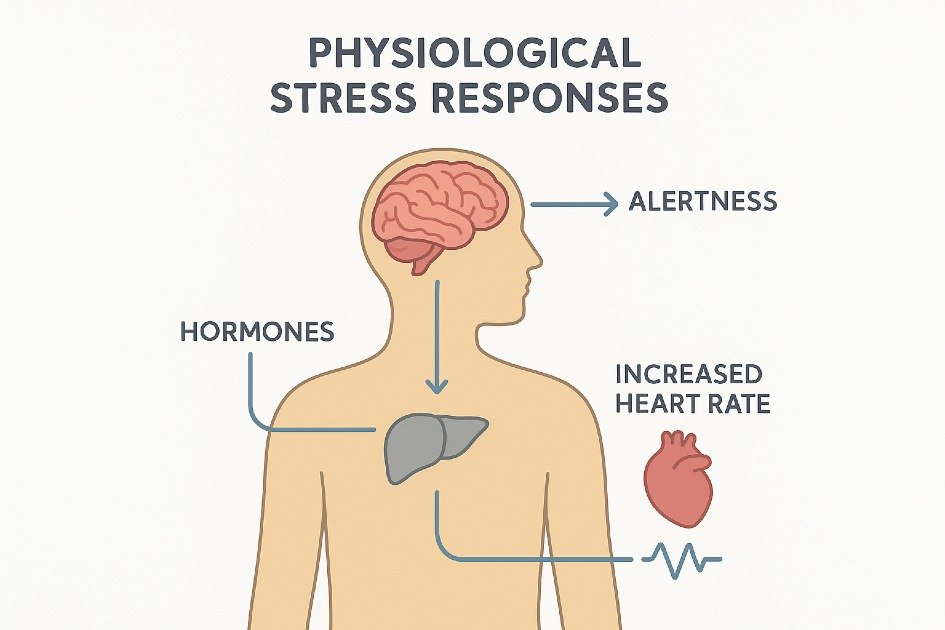
The Science Behind Stress Responses
Understanding how your body reacts to stress helps in identifying and managing stress triggers. By being aware of the internal processes during stress, individuals can feel more in control and better equipped to address these challenges.
Your Brain and Body React Instantly to Stress
When faced with a stress trigger, the brain sends a distress signal that activates the hypothalamus, initiating the fight-or-flight response and releasing hormones like adrenaline and cortisol.
This response increases heart rate, quickens breathing, and tightens muscles, serving as a protective mechanism.
However, when triggered frequently by everyday annoyances, this reaction can lead to chronic alertness, draining energy.
When you feel a stress trigger, pause and try grounding. Use the 4-7-8 breathing method—breathe in for 4 seconds, hold for seven, and breathe out for eight.
I have learned that my body is not failing, it is just reacting to stress. When I step outside after a tough work call, I can feel my nerves calm down.
Understanding Short and Long Stress Effects
Not all stress is negative; short-term stress, known as acute stress, can enhance cognitive performance and motivation, like the nervous energy before a presentation.
Problems arise with chronic stress, which results from prolonged exposure to stressors, leading to elevated cortisol levels that can harm the immune system, disrupt sleep, and cause digestive problems.
The best way to manage stress is to notice early signs like tiredness or irritability. Simple daily habits—like morning stretches, writing in a gratitude journal, or limiting screen time—can help you feel calm and balanced again.
I used to grab my phone and check emails before even getting out of bed. Now, I start my day with a glass of water and a few quiet minutes to breathe and reflect before touching my phone. This simple change has made my mornings calmer and my mood lighter.
Stress affects people in diverse ways
Differences in stress responses among individuals can stem from personality traits, past experiences, and genetics. While some may remain calm during stress triggers, others may react more intensely.
Over-sensitive individuals might feel guilty for their reactions, but their nervous systems may be predisposed to heightened responses due to factors like past trauma or perfectionism.
Stop comparing yourself to others, focus on what works for you. Create your own stress relief toolbox with yoga, soothing music, or talking to someone you trust. You can also use therapy or guided meditation platform to manage your emotions and stay calm over time.
I used to feel embarrassed by how quickly stress could throw me off. But then I realized my sensitivity was a strength—it helped me notice slight changes others did not see.
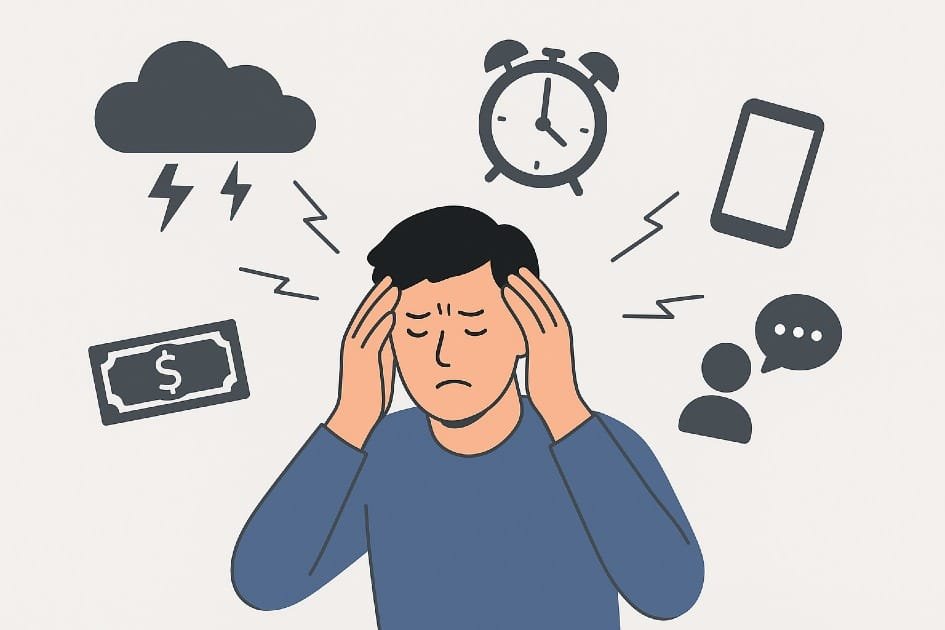
External Stress Triggers You Might Overlook
Stress can enter your life unnoticed through external triggers that blend into daily routines. These triggers can eventually impact your well-being. By recognizing them, you can regain control and implement impactful changes.
Workplace Pressures and Unrealistic Deadlines
Why it matters:
Constant deadlines induce a sense of urgency that can lead to exhaustion and increased stress, weakening focus, lowering productivity, and negatively impacting health. This stress often extends into personal life, creating a feeling of being trapped in a cycle of insufficient time and resources.
How to do it:
- Split big projects into small, simple steps to stay focused and stress-free.
- Block your time with tools like Todoist or Google Calendar to balance work and life.
- Respectfully discuss unrealistic deadlines with your manager and suggest workable timelines.
- Take brief breaks during long work sessions to refresh your mind and boost focus.
Financial Strain and Money-Related Worries
Why it matters:
Financial stress significantly impacts life, creating a mental burden from concerns about bills, debts, and expenses. Prolonged financial strain can heighten anxiety and lead to physical symptoms.
How to do it:
- Track your spending and plan your money with apps like Mint.
- Set up automatic savings, even tiny amounts, to build a safety cushion and ease financial stress.
- If debt feels too heavy, get help from a financial counselor to ease the burden.
- Notice and celebrating small money wins to build progress, not worry.
Relationship Conflicts That Spark Tension
Why it matters:
Arguments with loved ones or coworkers can trigger lingering emotional stress that affects mental clarity, sleep, mood, and self-esteem. Avoiding conflict does not resolve the issues and may exacerbate stress.
How to do it:
- Listen fully before responding—understand first, defend later.
- Speak with ‘I’ statements to share your feelings clearly and take responsibility without blaming others.
- Look for compromise to break the cycle of repeated conflicts.
- When conflicts feel too big, try couples or family therapy to find clear solutions.
Environmental Factors Like Noise and Crowds
Why it matters:
Your surroundings can significantly impact your stress levels, with constant noise, disorganization, and overcrowding serving as hidden stress triggers. Chaotic environments hinder focus, clarity of thought, and calmness, leading to low-grade stress that accumulates if ignored.
How to do it:
- Set up a calm corner at home to relax and recharge whenever you need.
- Clearing one small space at a time—tidying your desk can instantly lower stress.
- Block distractions with noise-canceling headphones or relaxing YouTube playlists.
- Run errands during quiet hours to avoid crowd stress.
I focus on spotting my stress triggers instead of trying to remove all stress. By adjusting my surroundings, how I communicate, my finances, and work habits, I build a calmer, stronger life.
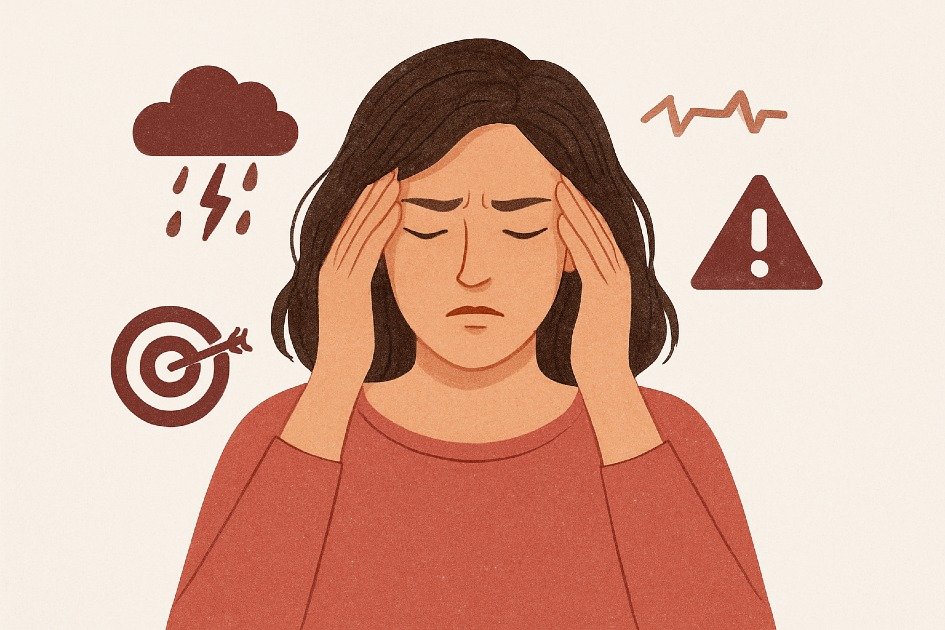
Internal Stress Triggers You Carry Within
Stress can stem from internal triggers such as daily thoughts and beliefs, not just external factors like job or financial issues. Recognizing these internal triggers is crucial, as it allows individuals to take control of their stress levels.
Quiet the Voice That Drains You
Why it matters:
Constant self-criticism increases stress and diminishes confidence, as negative thoughts exacerbate minor issues into major challenges, perpetuating cycles of doubt.
How to do it:
- Turn self-criticism into self-kindness by using gentle, encouraging words with yourself.
- Jot one daily win to boost confidence and track progress.
- Practice daily affirmations or follow guided meditations to calm your mind and boost focus.
- Think: “Is this something I’d say to someone I care about?”
Perfectionism Keeps You Chasing the Unreachable
Why it matters:
Striving for perfection results in constant tension, transforming ordinary tasks into high-stakes battles, which generates significant stress and diminishes opportunities for rest and joy.
How to do it:
- Aim for achievable goals, not perfect ideals.
- Focus on your progress, not perfection.
- Focus on finishing, not perfecting. Progress grows when you act, not when you wait for flawless results.
Fear of Failure Slows Your Progress
Why it matters:
Fear can inhibit action by making challenges seem daunting, leading to stress that hinders personal growth opportunities.
How to do it:
- See failure as a lesson, not a stop sign.
- Remember times when mistakes helped you grow and achieve better results.
- Step a little beyond what feels safe growth starts small.
- Mindful.org offers simple journaling prompts to help you face and reduce fear.
Breaking Free from Endless Thoughts
Why it matters:
Constant mental replay, or overthinking, magnifies problems and drains energy, resulting in mental exhaustion and hindering clear decision-making.
How to do it:
- Set aside 10 minutes daily to focus on your worries, then move on with your day.
- Ground yourself by naming five things you notice around you.
- Keep your mind busy with focused activities like puzzles, exercise, or cooking.
- Explore practical mindfulness exercises at Mindful.org to reduce stress and boost focus.
Escape the Trap of “Shoulds” and Unrealistic Goals
Why it matters:
Holding yourself to impossible standards generates guilt and pressure, transforming daily life into a series of perceived failures. This stress impedes the ability to recognize and appreciate small victories.
How to do it:
- Set goals that fit your life right now.
- Focus on what matters most, not what feels urgent.
- Count and appreciate your daily achievements.
I manage my stress by spotting what triggers it. I change my inner talk, ease perfectionism, and set realistic expectations. These small shifts help me stay calm, break stress cycles, and enjoy daily peace.
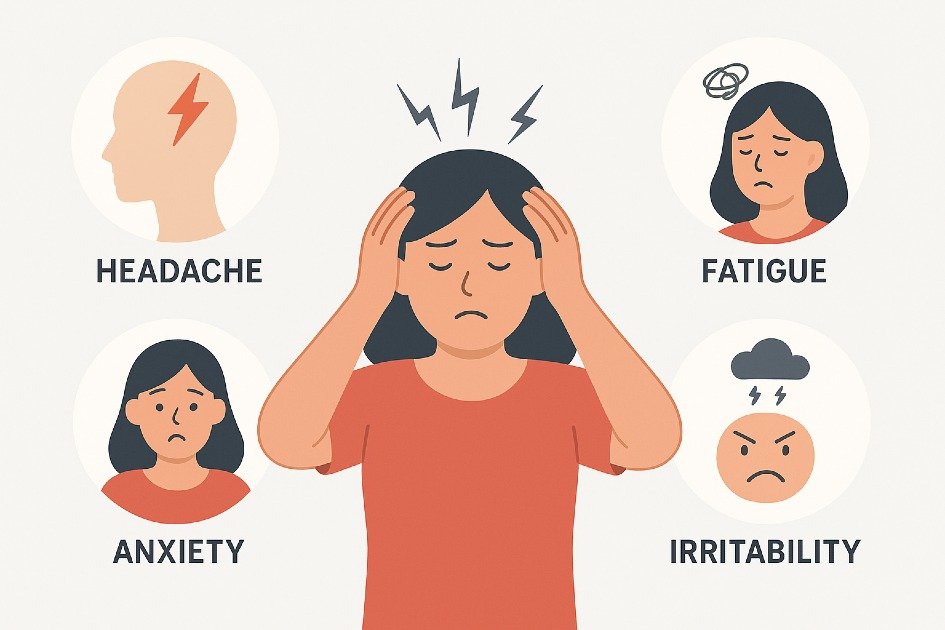
Notice Body and Mind Stress Signals
Understanding the subtle signs of stress—both physical and emotional—can help you address triggers before they escalate into overwhelm. Recognizing these signals enables you to focus on the root causes rather than merely alleviating symptoms.
Subtle Body Signals You Should Not Ignore
Why it matters:
Stress manifests physically before it is recognized mentally. Being aware of these bodily signals allows for early detection of stress triggers. Neglecting these signs may lead to chronic stress and associated health risks, such as high blood pressure and fatigue.
How to do it:
- Daily, give thanks for what you achieve and watch your body for tension—like tight shoulders, a clenched jaw, or shallow breaths.
- Track when headaches, stomach aches, or stiff muscles appear.
- Use a neck massager to quickly ease tension and relax your muscles.
Emotional Patterns That Reveal Hidden Triggers
Why it matters:
Emotions serve as indicators of stress origins, with minor irritations often revealing more significant underlying problems. By understanding these patterns, one can prevent outbursts towards loved ones or coworkers.
How to do it:
- Record low moods in a journal and note what triggered them.
- Notice and name your emotions—anger, sadness, or worry—without judging them.
- Use guided meditation to quickly restore calm and focus.
Stress Overload Sparks Sudden Mood Swings
Why it matters:
Rapid mood swings indicate unmanaged stress and can be draining and unpredictable, signaling underlying issues. These swings impact relationships and focus, but understanding their connection to stress can help restore emotional steadiness.
How to do it:
- Notice when your mood dips—like in the afternoon or after work. These moments can reveal hidden stress triggers.
- Cut back on caffeine and sugar to keep your mood steady.
- Calm your nerves quickly by taking slow breaths or stepping outside.
Listening to Stress Signals Without Panic
Why it matters:
To manage stress effectively, view body and emotion signals as helpful data instead of threats. By maintaining calm awareness, you can distinguish between genuine triggers and temporary discomfort, reducing the fear associated with stress signals.
How to do it
- Stop and notice: What is this feeling trying to tell me?
- List your stress triggers and spot patterns that keep repeating.
- Talk openly with a friend, counselor, or online support group.
By journaling or taking a few deep breaths, I respond calmly when my body tenses or my mood changes. Paying attention to these signals helps me manage stress instead of letting it control me.
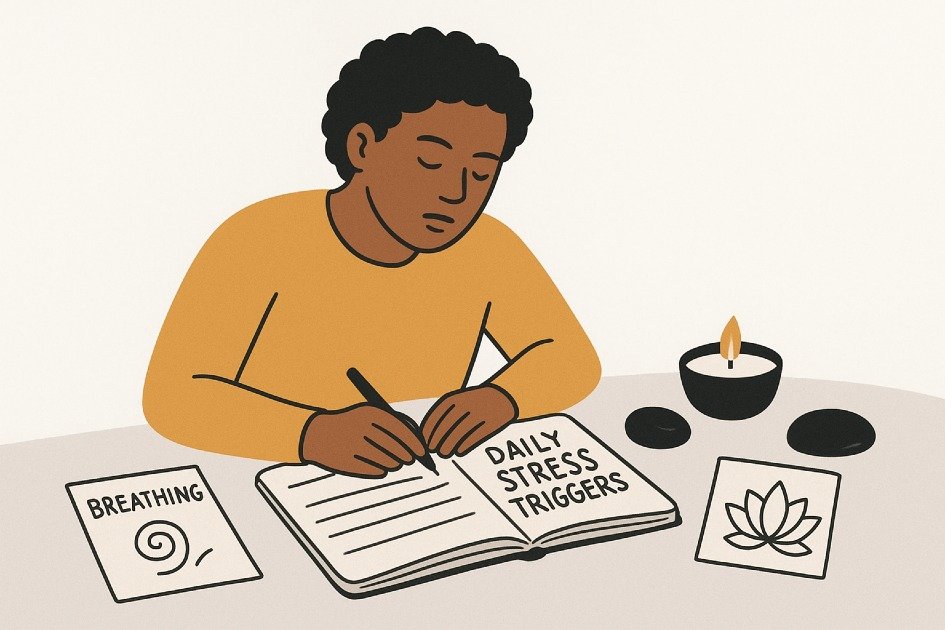
How to Spot Your Personal Stress Patterns
Learning to identify personal stress triggers is crucial for regaining everyday balance. Recognizing these patterns allows for a transition from reactive behavior to calm control.
Keep a Stress Journal
Why it matters:
Writing in a journal helps identify stress patterns by providing insight into when and why stress levels rise, thereby reducing confusion and clarifying top stress triggers.
How to do it:
- Record the date, time, and place each time you feel stress.
- Notice how your body responds—headaches, chest tightness, or sweaty hands.
- Capture what ran through your mind in that moment. Focus on your thoughts clearly and honestly.
- Check your notes each week to spot repeated stress triggers.
Notice Trigger Times in Your Daily Routine
Why it matters:
Stress commonly manifests at specific times, such as in the mornings, during commutes, or late at night. Identifying these “hot zones” allows for better preparation, mitigating the impact of stress triggers through increased awareness.
How to do it:
- Notice your mornings: are you stressed, distracted, or easily annoyed?
- Notice what drains you at work: Which tasks or meetings leave you tired?
- Notice your evenings: which tasks or talks trigger stress?
- Spot stress patterns and add quick buffers—like a short walk or calming music—to ease tense moments.
Reflect to Uncover Hidden Sources of Tension
Why it matters:
Reflection is essential to identify hidden stress triggers, which may be ingrained in beliefs, habits, or routines. Without it, minor irritations can accumulate and become overwhelming.
How to do it:
- Spend 5 minutes before bed reflecting on your day to gain clarity and calm your mind.
- Notice what wore you out today and what boosted your energy.
- Use guided questions or platform like Mindful.org to calm your mind and slow racing thoughts.
- Note every little irritation—they often hide your main stress triggers.
Tune Into Your Body’s Subtle Clues
Why it matters:
Your body reacts to stress physically before you consciously acknowledge it. Early signs, such as clenched jaws or shallow breathing, serve as alerts. Recognizing these signals promptly can prevent stress from escalating.
How to do it:
- Take a moment to check your body, relax your shoulders, soften your stomach, unclench your jaw.
- Pay attention to muscle tightness, restless movements, or sudden tiredness.
- Notice tension, then reset—stretch, drink water, or take deep breaths.
- Track stress by using wearables like Fitbit to monitor sudden heart rate spikes.
Spot Emotional Patterns
Why it matters:
Emotions tend to recur in reaction to stress triggers. By identifying the onset of feelings such as frustration, sadness, or anxiety, one can make connections that enable a calmer response rather than an automatic reaction.
How to do it:
- Track your moods in a simple weekly chart. Watch patterns, spot triggers, and take control of your emotional health.
- Notice when anger, worry, or stress take over.
- Link your feelings to the events that triggered them.
- When you spot the link between your stress and its cause, you can choose healthier ways to respond.
Ask Others for Feedback
Why it matters:
Outside perspectives can highlight your stress triggers, revealing blind spots and patterns you may have missed. Honest feedback can facilitate meaningful change.
How to do it:
- Ask someone you trust, “When do I seem most stressed to you?”
- Listen to their feedback calmly and try to understand, not defend.
- Match their feedback with what you wrote in your journal.
- Find the common patterns to spot your main stress triggers.
I have learned that spotting my stress patterns starts with awareness, not control. By recognizing what triggers my stress, I can pause, reset, and protect my peace—so stress does not rule my day.
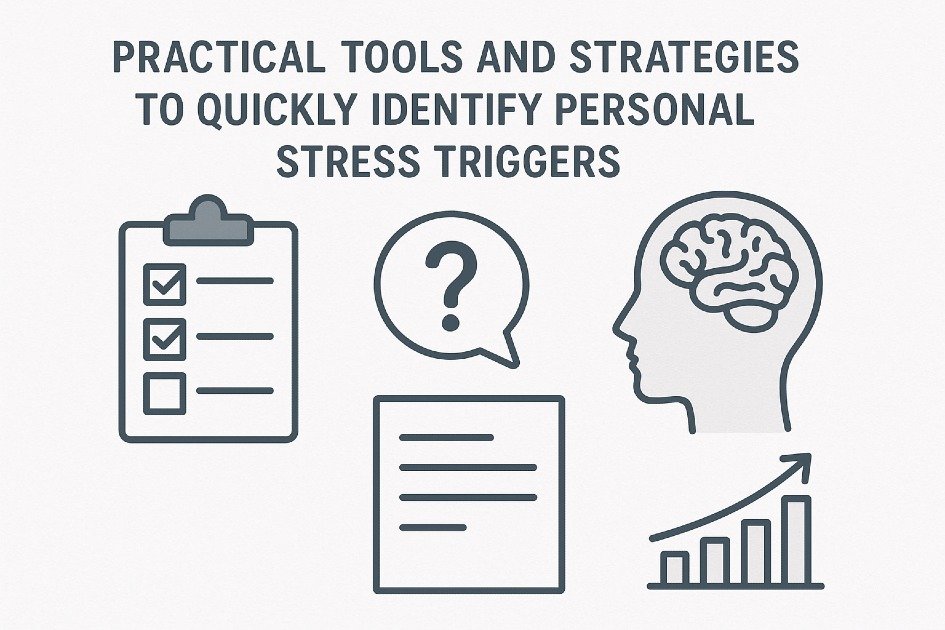
Tools to Identify Stress Triggers Quickly
Understanding your stress triggers illuminates the factors causing your stress, empowering you to react more effectively, and presents practical tools that clarify their significance and provide immediate actionable steps.
Use Mindfulness to Catch Triggers in Real Time
Why it matters:
Practicing mindfulness enhances your ability to identify stress triggers early, allowing you to pause and prevent overwhelming reactions.
How to do it:
- Take 5 minutes each day to focus on your breath and stay present.
- Pay attention to your breathing and gently bring your mind back when it starts to drift.
- When you feel tense or upset, pause and take three deep breaths to calm your mind.
- Use a guided meditation app like Mindful.org to relax your mind and build calm habits every day.
Keep a Simple Stress Journal
Why it matters:
Writing down patterns in a journal clarifies recurring stress triggers and transforms vague feelings into actionable insights through reflection.
How to do it:
- Each night, write down the moments that made you feel stressed.
- Pay attention to what is happening, how you feel, and how your body reacts.
- Check your week to find what stress you most—like long meetings, busy commutes, or tough talks.
- Try a guided planner like The Five Minute Journal to stay focused and make journaling simple.
Practice Conscious Breathing Before Reacting
Why it matters:
Breathing can calm the nervous system and prevent impulsive reactions to stress triggers, as slow, intentional breaths signal safety to the brain.
How to do it:
- Breathe using the “4-7-8” method: inhale for 4 seconds, hold seven, then exhale eight. It calms your mind fast.
- Try this before calls, in traffic, or after a fight to stay calm and focused.
- Set a daily alert on your phone or watch to stay consistent.
Leverage Stress Tracking Apps
Why it matters:
Technology aids accountability and consistency by utilizing apps that reveal hidden stress triggers through data such as heart rate, sleep quality, and activity.
Tracking these metrics makes stress patterns clearly visible.
How to do it:
- Track your mood with an app like Calmerry or monitor your activity with a Fitbit.
- Track your moods, sleep, and activities as part of your daily routine.
- Check your weekly reports to link stress to exact events or moments.
- Combine it with journaling to gain clear insights.
Create Boundaries with Technology
Why it matters:
Constant notifications and endless scrolling serve as stress triggers, leading to digital overload that drains focus and amplifies minor irritations.
How to do it:
- Create phone-free times, like during meals or right after waking up.
- Mute all non-essential notifications to focus better and reduce stress.
- Check social media only twice daily to stay focused and reduce stress.
- Use apps like Freedom to block distractions and control screen time.
Adjust Your Sleep Routine
Why it matters:
Poor sleep increases stress reactions, making even minor stressors seem daunting. Quality rest enhances resilience, enabling better management of daily challenges.
How to do it:
- Go to bed and wake up at the same time every day to strengthen your body’s natural sleep rhythm and boost energy.
- Unwind each night: lower lights, stretch, or read something calming.
- Skip big meals and screens one hour before bedtime to sleep better.
- Use sleep aids like weighted blankets or sound machines to rest better.
Check for Physical Clues in Your Body
Why it matters:
Your body frequently responds to stressors before your mind is aware. By recognizing these signals, you can manage stress proactively, preventing it from worsening.
How to do it
- Feel tight shoulders, sudden headaches, or a fast heartbeat during the day.
- Pause and ask: “What just happened to make my body feel this way?”
- Combine this check-in with journaling to track your progress accurately.
- Do a body scan by focusing from head to toe, noticing tension, and gently release it.
I do not need to cut out all stress to feel calm. I notice triggers early and use tools like mindfulness, journaling, and support to manage them.
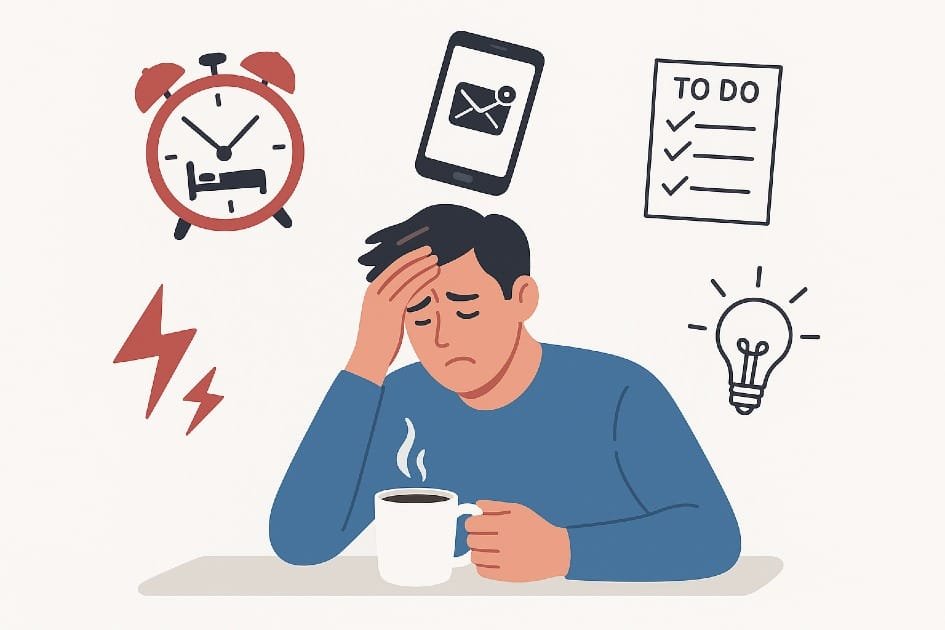
When Everyday Habits Become Triggers
Everyday habits can often cause stress more than major life events by increasing tension, fatigue, and irritability. However, with awareness, these habits can be transformed into healthier routines that promote calmness.
Caffeine Powers You Up Then Slows You Down
Why it matters:
A morning coffee can seem essential, yet excessive caffeine can overstimulate the nervous system and increase cortisol levels, amplifying stress and irritability.
This reliance may lead to a cycle of jitters, energy crashes, and disrupted sleep patterns.
How to do it:
- Try swapping your second or third coffee for green tea—it boosts energy gently and keeps you alert.
- Drink water before your coffee to prevent dehydration, a common stress trigger.
- Switch to herbal coffee for a comforting ritual without overloading your body.
Sugar Tricks Your Body into Trouble
Why it matters:
Sugar provides immediate relief but leads to fluctuations in blood sugar, resulting in mood swings, fatigue, and anxiety.
This cycle of cravings can entrap individuals in repeated highs and lows.
How to do it:
- Choose whole fruits instead of processed snacks to enjoy natural sweetness and boost your health.
- Include protein or fiber in your meals to help slow sugar spikes.
- Use low-glycemic sweeteners to satisfy your sweet tooth without spiking blood sugar.
Sleep Habits That Heighten Stress
Why it matters:
Quality sleep is essential; without it, your body remains in a “fight-or-flight” state, leading to decreased patience, focus, and resilience.
This results in heightened reactions to stress, while accumulating sleep debt further diminishes energy levels over time.
How to do it:
- Unwind nightly: lower lights, stretch gently, or jot your thoughts before sleep.
- Make your room cool and dark to help your body rest deeply.
Constant Tech Use Drains Your Energy
Why it matters:
Constant notifications and excessive screen time can overstimulate the brain, blur work-life boundaries, and create stress.
Additionally, excessive scrolling contributes to feelings of comparison, anxiety, and mental fatigue.
How to do it:
- Turn off notifications at meals and before bed to protect your focus and rest.
- Set daily tech-free hours to recharge your mind offline.
- Wear blue-light glasses to ease eye strain and sleep better.
Missed meals quietly fuel stress
Why it matters:
Missing meals decreases blood sugar levels, resulting in irritability and lack of focus. This condition intensifies minor stressors due to insufficient brain fuel.
Additionally, meal skipping may result in subsequent overeating, increasing both mental and physical discomfort.
How to do it:
- Build meals with protein, healthy fats, and fiber for balanced nutrition.
- Stock quick, healthy snacks like fruit or nuts for anytime energy.
- Plan meals with apps to save time and never skip a healthy bite.
Body Tension Builds Without Movement
Why it matters:
A sedentary lifestyle can lead to stress accumulation in muscles and joints, as inactivity hinders the body’s ability to release tension.
Even brief periods of inactivity can intensify stress triggers.
How to do it:
- Pause for a quick 5-minute stretch to boost energy and reduce tension.
- Step outside and walk to lift your mood and see things clearly.
I have found that spotting my stress triggers does not need huge changes. By cutting back on coffee, setting limits on my screen time, and keeping a steady sleep schedule, I feel calmer and more in control.
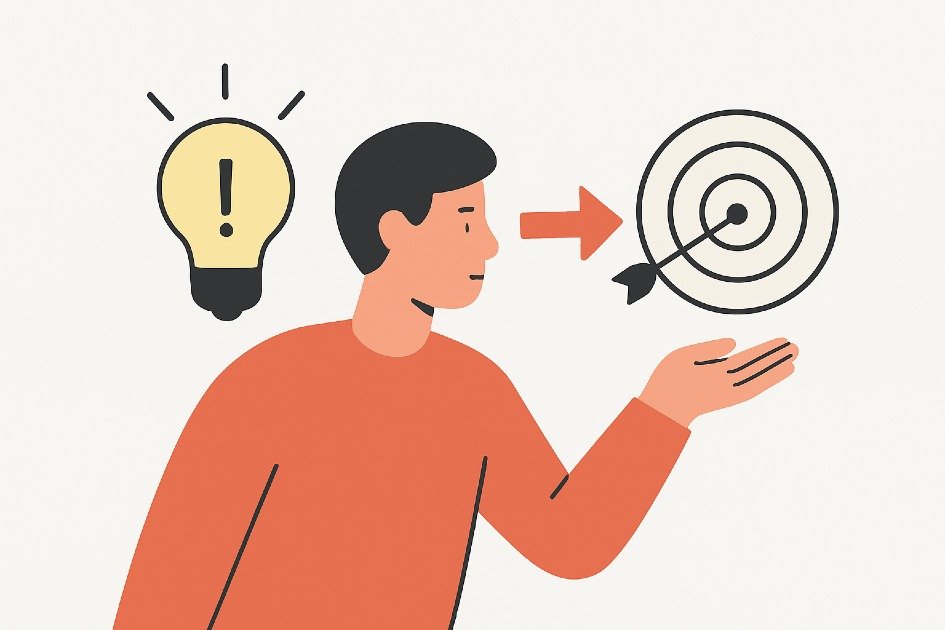
Turning Awareness into Action
Identifying stress triggers is the initial step; real growth occurs when this awareness is transformed into daily action.
Understanding the importance of change and applying it can lead to a calmer and more controlled life, where small adjustments result in significant outcomes.
Set Boundaries to Protect Your Mental Space
Why it matters:
Boundaries function as a vital shield against stress triggered by overcommitment and interruptions, helping to prevent burnout, resentment, and ongoing tension.
How to do it:
- Say no to tasks that do not match your goals.
- Say it clearly: ‘I can’t do this right now.’
- Avoid people or places that increase your stress.
- Set daily quiet time on your calendar and treat it as non-negotiable self-care.
I say no today to protect my energy for tomorrow.
Replace Negative Self-Talk with Constructive Words
Why it matters:
Internal dialogue can increase stress more than external events, as negative self-talk like “I’m failing” or “I can’t manage this” amplifies stress levels and decreases confidence.
How to do it:
- Notice negative thoughts as they happen and pause before accepting them as true.
- Replace harsh words with kind, helpful ones that guide improvement.
- Carry a few positive affirmations to shift your mindset during hard moments.
- Acknowledge every small win to see how far you have come.
I train my inner voice to guide me, not judge me.
Build Restorative Routines Around Known Triggers
Why it matters:
Building a counter-routine can mitigate the effects of predictable stress triggers, such as morning traffic or tight deadlines, allowing one to alleviate lingering stress after these situations.
How to do it:
- Ease stress by taking deep breaths or a quick walk during tense moments.
- Take quick reset breaks around your stress triggers to stay calm and focused.
- Reset your mood with calming rituals like tea, music, or gentle stretches.
- Keep a soothing item close, like a stress ball or calming scent, to ease tension instantly.
I cannot always remove stress, but I can control how my body reacts to it.
Use Mindfulness to Respond Instead of React
Why it matters:
Stress triggers can lead to automatic, reactive behaviors such as snapping at others or excessive worrying, while mindfulness can disrupt these patterns.
How to do it:
- Do a quick body check when stress hits. Notice where you feel tightness, then breathe deeply to release it.
- Take a slow, deep breath for 60 seconds to calm your mind and reset your focus.
- Pay attention to what you feel without judging it or trying to make it stop.
- Focus your mind on what is happening now, not on “what if” thoughts.
When I take a small pause, I get to choose how I respond instead of just reacting. It helps me stay calm and make better decisions.
Shift Habits to Calm Everyday Stress
Why it matters:
Certain habits, such as excessive caffeine intake, late-night phone use, and skipping meals, can exacerbate stress. Adjusting daily habits can help reduce overall stress levels.
How to do it:
- Choose herbal tea instead of afternoon coffee to stay calm and avoid energy crashes.
- Build a Tech-Free Bedtime Routine for Better Sleep
- Keep healthy snacks nearby to stay energized and avoid midday slumps.
- Move your body every day — even simple stretches help ease tension and keep you feeling calm.
By making small daily changes, I build a steady buffer that keeps stress from taking over my day.
Share Your Stress Triggers with Supportive People
Why it matters:
Sharing stress with a trusted individual lightens the burden by providing perspective and accountability.
How to do it:
- Be honest about what stresses you out. Do not downplay it or pretend it is small.
- Reach out for honest feedback or just someone to listen.
- Tell people what helps you when you feel stressed. Be clear about what you need, a quiet space, a short walk, or someone to listen.
- Surround yourself with people who lift you up.
When people around me understand what sets off my stress, everything feels lighter. They know when to step in, offer support, or simply listen. I do not have to carry it all alone—and that makes managing stress so much easier.
Creating a Personal Action Plan
Why it matters:
Awareness requires a plan to remain effective; a personal action plan transforms ideas into daily habits, ensuring focus and consistency.
How to do it:
- List your three biggest stress triggers.
- Match each trigger with one clear action step.
- Check your plan each week to track progress.
- Adapt your approach—stress triggers change with time.
When I notice my stress triggers, I take charge of my life. Acting on them builds my confidence, strengthens my resilience, and brings balance. Awareness sparks change, and my actions shape a better life.

Seeking Support for Hidden Stressors
Identifying a stress trigger is just the beginning; true growth occurs when one seeks help and builds a support system.
Many attempt to manage stress alone, but this silence can intensify their struggles. With proper support, individuals can better understand their stress triggers and respond in healthier ways.
Leaning on Friends and Family
Why it matters:
Changes in mood, habits, or energy levels can be noticed by loved ones.
Discussing stress triggers with a trusted person helps reduce feelings of isolation and fosters connection, while emotional support offers reassurance in facing challenges.
How to do it:
- Speak up when stress builds, even about insignificant things.
- Invite others to share honest observations about your behavior patterns.
- Set weekly walks or check-ins where talking happens naturally.
- Ask someone to keep you on track with your self-care habits.
Turning to Professional Guidance
Why it matters:
Therapists, coaches, or counselors help individuals explore the underlying aspects of stress triggers by offering unbiased perspectives and creating a safe, non-judgmental environment for validating thoughts and feelings.
How to do it:
- Begin by searching online for licensed professionals in your area.
- Check local health directories or try online therapy if visiting in person feels hard.
- Try short trial sessions to choose a professional whose style suits you.
- Request practical tools, such as journaling prompts or guided exercises, to continue progress after the session.
Finding Supportive Communities
Why it matters:
Shared experiences highlight that stress triggers are common and not shameful.
Community groups offer alternative coping strategies. Feeling understood helps reduce stress and boosts resilience.
How to do it:
- Join online groups or forums focused on stress management to share tips and support.
- Attend a local yoga, meditation, or support group to connect with others in person.
- Join stress management workshops for clear, guided techniques.
- Tell your story and hear others’—healing grows when we connect.
Using Workplace Resources
Why it matters:
Work stress often comes from deadlines, heavy workloads, or unclear expectations.
Many companies offer Employee Assistance Programs (EAPs), but few employees use them. Getting support at work can reduce burnout and boost productivity.
How to do it:
- Ask HR or read your employee handbook to find available wellness benefits.
- Ask for flexible hours or a quiet space if noise or crowds stress you.
- Take part in lunchtime meditation to boost your wellness.
- Encourage short breaks to refresh your mind during stressful times.
Building Your Own Support Toolkit
Why it matters:
Having tools ready enables quick action during stress triggers, while personal strategies help regain control over impulsive reactions.
This approach fosters resilience and boosts confidence in managing life’s challenges over time.
How to do it:
- Build a soothing playlist to help you relax when stress hits.
- Keep a stress journal to spot your triggers and patterns.
- Use meditation platforms or relaxation tools to quickly relieve stress.
- Create a list of people you can call for support when stress hits.
I know my stress triggers do not define me—how I respond does. Reaching out for help makes me stronger, not weaker. I talk to friends, professionals, or join supportive groups.
Recap: Turning Awareness into Strength
Every challenge presents clues, including stress triggers. Recognizing these triggers allows you to regain control over your reactions, transforming chaos into clarity.
Stress triggers can be found in various areas of life and identifying them reveals opportunities for growth rather than setbacks.
Mindfulness practices like yoga, tai chi, and rhythmic exercises enhance awareness of bodily signals, aiding in effective stress management, according to Harvard Health.
Sharing experiences in a community can inspire others. Using tools like journaling and mindfulness can further support this journey.
Stress triggers serve as messengers, indicating where healing and boundaries are needed for a balanced life.
Frequently Asked Questions
How do I know if something is truly a stress trigger or just a difficult day?
True stress triggers elicit consistent emotional, mental, or physical responses like headaches and irritability.
Maintaining a daily stress journal can help identify patterns, and resources like Mindful.org can assist in tracking real-time reactions for clarity.
Can stress triggers change over time?
Life is dynamic, with stressors changing over time, such as work deadlines in early career stages versus family responsibilities later.
Regular self-assessment can help identify and manage these evolving triggers before they lead to chronic stress.
What is the best first step if I feel overwhelmed by too many stress triggers?
Overload can obscure the identification of specific stress triggers. Isolate one trigger at a time and employ techniques such as breathing exercises, journaling, or brief meditative breaks to assess your reactions.
How can I talk about my stress triggers with others without feeling judged?
Being sincere about stress triggers requires delicacy; however, being transparent can foster understanding and support. It is beneficial to frame discussions around individual experiences, using phrases like “I notice I get anxious when…” rather than placing blame.
Is it possible to eliminate stress triggers?
Reducing the impact of stress triggers is achievable through strategies such as cognitive reframing, boundary-setting, and lifestyle adjustments, rather than attempting complete eradication.
Can minor habits function as hidden stress triggers?
Trivial habits, such as excessive caffeine intake, irregular sleep, and high screen time, can function as chronic stress triggers. Recognizing these subtle triggers is essential for effective stress management, and using sleep or nutrition tracker may help reveal hidden patterns.
How do I know if stress trigger is physical, emotional, or environmental?
Understanding stress triggers is essential, which can be categorized into physical (e.g., muscle tension, headaches), emotional (e.g., anxiety, irritability), and environmental triggers (e.g., noise, clutter).
Monitoring responses over time aids in distinguishing these types, and tools like stress-monitoring wearables can offer valuable data for better decision-making.
Can identifying stress triggers improve overall health?
Recognizing stress triggers allows for proactive interventions that can lower inflammation, enhance sleep quality, and improve cognitive focus, thereby safeguarding mental and physical health. Utilizing adaptogenic supplements or relaxation programs may promote stress resilience.
How often should I reassess my stress triggers?
Regularly reassessing your life, especially during major transitions, is important to identify emerging stress triggers early. Digital stress journals or reflection apps can facilitate this process and ensure your strategy remains actionable.
Are stress triggers always negative, or can some be motivating?
Not all stress triggers are harmful; some, such as challenging deadlines or competitive environments, can enhance productivity and focus if managed wisely.
It is essential to differentiate between constructive and harmful stress. Performance-enhancing mindfulness programs can be explored to effectively harness positive triggers.

